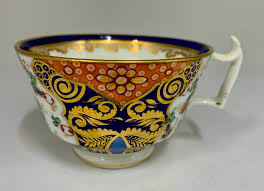|
Mary Wollstonecraft was not known for her dedication to domesticity. She is said to have once entertained the Marquis de Talleyrand in her lodgings on George Street, and served him tea, then wine, in a breached teacup (Elizabeth Pennell, 1885. Mary Wollstonecraft Godwin. London: W.H. Allen &co, p.72). Wondering where Pennell had gotten the anecdote from, I asked the Twitter Wollstonecraft community, and got the following story: First Emma Clery, specified the source of the Pennell reference: John Knowles, the 19th century biographer of the man who rejected Wollstonecraft in 1792, Henri Fuseli, described her as a 'sloven ', citing the breached teacup anecdote as evidence. Fuseli found in her (what he most disliked in woman) a philosophical sloven: her usual dress being a habit of coarse cloth, such as is now worn by milk-women, black worsted stockings, and a beaver hat, with her hair hanging lank about her shoulders. These notions had their influence also in regard to the conveniences of life; for when the Prince Talleyrand was in this country, in a low condition with regard to his pecuniary affairs, and visited her, they drank their tea, and the little wine they took, indiscriminately from tea-cups. But this, it turns out was not the first reference to the anecdote, but Eileen Hunt Botting pointed me to one published 4 years before that, in a Vermont journal: Perhaps their idea of an "educated lady" is associated in their mind with nothing better than some starched nun, or round mouth pedant; or the famous authoress of England, M. Woolstonecroft [sic], who could appear before her guests in a ragged garment, and serve their drink in a broken tea-cup; because, forsooth, her literary occupations would not allow her otherwise. Note that the Vermont piece, but not the Knowles or Pernell ones, mentions that the cup was breached! Knowles's biography was published six years after Fuseli's death. Knowles claims that his evidence came from letters from Wollstonecraft to Fuseli, letters that Fuseli had refused to return when Wollstonecraft asked him to. Knowles was Fuseli's literary executor, so had access to the letters straightaway. The Vermont piece appeared three years before the publication of Knowles's memoirs, and two years after Wollstonecrafts' death? Was there another source? Or could someone else have seen the letters and quoted from them? Certainly Sophia Fuseli, Henry's wife saw them – possibly before Fuseli's death. Godwin asked to see them after Wollstonecraft died, so he could use them for his biography, but was refused. Their grandson, Sir Percy Florence Shelley ('Percy Jr annoys me to death' twitted another Wollstonecraft expert), bought them and had them burnt. According to Emma Clery, C Kegan Paul, friend of Godwin and supporter of Wollstonecraft, did see the letters before they were destroyed and claims there was nothing in them that could bring shame on Wollstonecraft (not that a breached tea-cup is shameful!). So possibly the reports of slovenliness are simply that – retellings of their contents, exaggerated for the sake of gossip. This could have been the work of Knowles himself, or perhaps Fuseli's widow, Sophia, who may have born a grudge from Wollstonecraft's attempts at forming a ménage à trois with Henry and Sophia. Stirring away from malicious gossip, the tea-cup story has a much more plausible explanation Wollstonecraft was poor. And at the time she lived in George Street, where Talleyrand visited her, she was just starting out as a professional writer, had debts to pay and family to support, so she had very few furnishings. Although glass objects were already a consumer item, wine glasses were nonetheless expensive, and a luxury that the singly professional woman, who had to move frequently, could perhaps not afford. It was not until she moved from George St, after meeting with Talleyrand, that she started to buy furniture: In September 1791, she removed from the house she occupied in George-street, to a large and commodious apartment in Store street, Bedford-square. She began to think that she had been too rigid, in the laws of frugality and self-denial with which she set out in her literary career; and now added to the neatness and cleanliness which she had always scrupulously observed a certain degree of elegance, and those temperate indulgences in furniture and accommodation, from which a sound and uncorrupted taste never fails to derive pleasure. Godwin. Memoirs. Chapter 6. With thanks to Eileen Hunt Botting (@EileenHBotting) Emma Clery (@austeneconomics) and Bee Rowlatt (@BeeRowlatt) for sharing all these sources and making yesterday afternoon's work much more fun than it would have been otherwise!
0 Comments
Leave a Reply. |
AboutThis is where I blog about my new book project (under contract with OUP): a history of the philosophy of the home and domesticity, from the perspective of women philosophers. Archives
March 2024
Categories |
Proudly powered by Weebly


 RSS Feed
RSS Feed